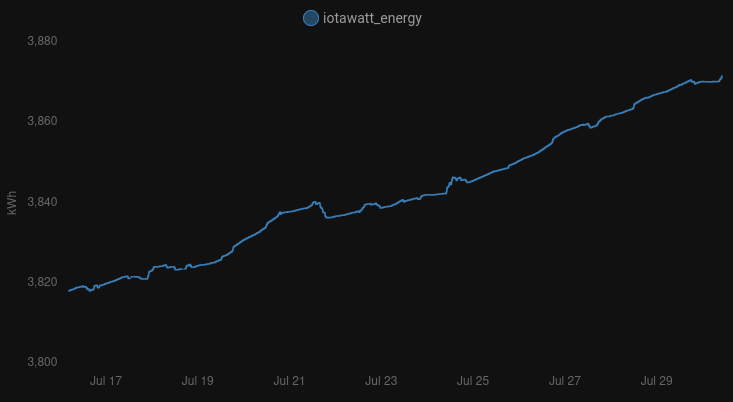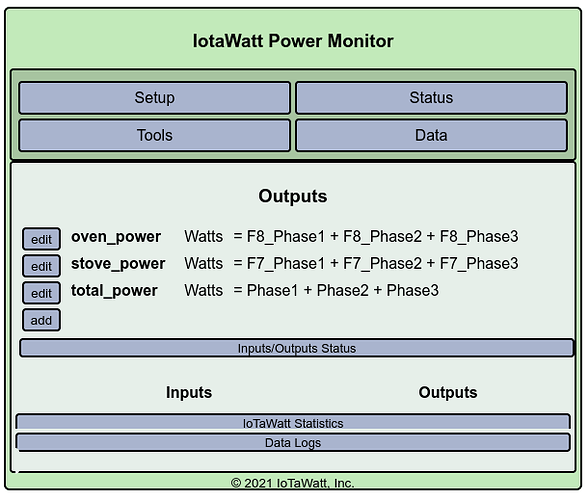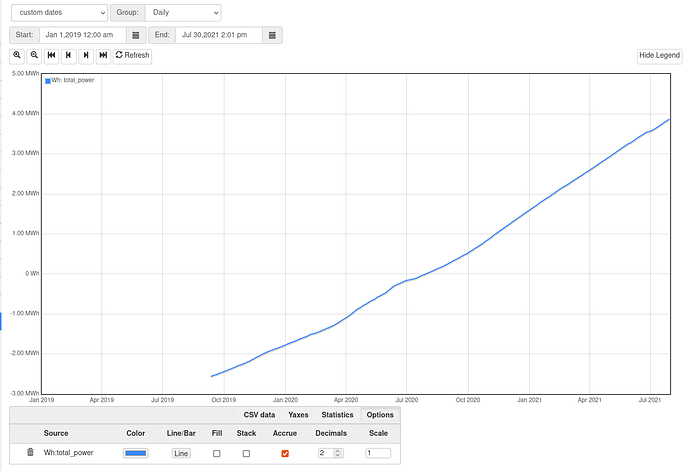Using the following query now:
curl -w "\n" 'http://iotawatt.lan/query?select=\[time.iso,Phase1.wh.d6,Phase2.wh.d6,Phase3.wh.d6,total_power.wh.d6\]&begin=2019-01-01T00:00:00&end=m&group=all'
The behavior seems the same. Also, it seems that all phases are contributing a bit to the problem.
[["2019-01-01T00:00:00",2313692.317,603012.5413,956415.3693,3873120.228]]
Fr 30 Jul 2021 17:01:52 CEST
[["2019-01-01T00:00:00",2313692.317,603012.5413,956415.3693,3873120.228]]
Fr 30 Jul 2021 17:01:53 CEST
[["2019-01-01T00:00:00",2313692.317,603012.5413,956415.3693,3873120.228]]
Fr 30 Jul 2021 17:01:54 CEST
[["2019-01-01T00:00:00",2313692.107,603012.5003,956415.2596,3873119.867]]
Fr 30 Jul 2021 17:01:55 CEST
[["2019-01-01T00:00:00",2313692.107,603012.5003,956415.2596,3873119.867]]
Fr 30 Jul 2021 17:01:56 CEST
[["2019-01-01T00:00:00",2313692.107,603012.5003,956415.2596,3873119.867]]
Fr 30 Jul 2021 17:01:57 CEST
[["2019-01-01T00:00:00",2313692.107,603012.5003,956415.2596,3873119.867]]
Fr 30 Jul 2021 17:01:58 CEST
[["2019-01-01T00:00:00",2313696.93,603012.8963,956415.5257,3873125.352]]
Fr 30 Jul 2021 17:01:59 CEST
[["2019-01-01T00:00:00",2313696.93,603012.8963,956415.5257,3873125.352]]
Fr 30 Jul 2021 17:02:00 CEST
[["2019-01-01T00:00:00",2313696.93,603012.8963,956415.5257,3873125.352]]
Fr 30 Jul 2021 17:02:01 CEST
[["2019-01-01T00:00:00",2313696.93,603012.8963,956415.5257,3873125.352]]
Fr 30 Jul 2021 17:02:02 CEST
[["2019-01-01T00:00:00",2313696.93,603012.8963,956415.5257,3873125.352]]
Fr 30 Jul 2021 17:02:04 CEST
[["2019-01-01T00:00:00",2313696.721,603012.8551,956415.4163,3873124.992]]
Fr 30 Jul 2021 17:02:05 CEST
[["2019-01-01T00:00:00",2313696.721,603012.8551,956415.4163,3873124.992]]
Fr 30 Jul 2021 17:02:06 CEST
What I’ve noticed is that right at the minute boundary the value jumped back up. This is my PC’s clock, but its pretty much in sync with what IoTaWatt has.
Thanks for looking into it! Not urgent on my side, I am using begin=y currently, which seems to work. But probably still worth getting to the bottom of this.
Is using the Query API with begin=y an efficient method to get a energy consumption value? I can use pretty much any timescale, whatever is efficient for IoTaWatt.
![]()


